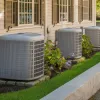Many homeowners are considering ditching gas for an all electric home. It’s easy to see why! Many experts believe that much of our energy will one day come from non-fossil fuel sources. Whether that’s solar, wind, or nuclear power, it will be electric.
If you’re also thinking that an all electric home could help you save on your energy bills, you’re definitely onto something!
That being said, there are several things to consider before you take the leap and make your home all electric. Depending on your priorities, you may find it more advantageous to only partially switch to electric – or to make the transition gradually.
Let’s take a look at the pros and cons of having an all electric home. We’ll also explore a potential alternative to going all electric and to maintaining your status quo. Also, we’ll discuss these options in the context of heating systems, since your furnace is probably the gas appliance that has the biggest impact on your utility bills.
Benefits of an all electric home
Here in the Southeast, around 20% of homes are already all electric. That’s because electric heat pump systems tend to perform much better in our climate than in colder places. Around Atlanta, we service air-source heat pumps all the time – and many of them are in all electric homes!
If you currently heat your home with a gas furnace, you might be thinking about getting a heat pump instead when it’s time to replace your furnace. There are good reasons to do this, including:
- Low cost: Modern heat pumps are often touted as more efficient or at least as efficient as gas furnaces. In reality, that’s a tough one to prove – especially at times when natural gas prices happen to be quite low. What definitely is true, however, is that today’s heat pumps are significantly more efficient than what was available 20 years ago. Even if your heat pump isn’t technically as efficient as a gas furnace when the cost per therm is low, it’s still an efficient, low-cost heating option. Some of the most efficient heat pumps on the market don’t even need heat strips for really cold days!
- Better comfort: Many people prefer the kind of heat they get from a heat pump. Compared to a natural gas furnace, a heat pump doesn’t burn as hot, and the airflow tends to be more continuous and steady. Heat pumps also don’t dry your air out as quickly as the heat from a gas furnace. This benefit is subjective, however, as some people still prefer the kind of heat they get from a gas furnace. If you think you prefer the heat from a gas furnace but are interested in going all-electric, consider Carrier’s heat pumps with Greenspeed technology. These units produce warmer, more “gas furnace-like” heat than typical heat pumps.
- No gas bill: One less utility company to deal with! Hey, anything that can make life a little bit easier, right?
All of these things sound great – and they are! But there are some downsides to going all electric, too.
Downsides of going all electric
An all electric home certainly has its upsides, but it’s not all roses and kitty cats either. Here are some reasons to keep your gas appliances, at least for now:
- There’s not much cost savings yet. Energy prices change all the time, but current (2022) gas and electric utility rates in the Atlanta area are roughly equal in terms of how much you ultimately pay for heating. Will that change as electricity gets more efficient? Probably, but we’re not fortune tellers! Just know that you might not save much in the short term.
- There aren’t many environmental benefits yet. Today, much of the electricity generated in Metro Atlanta comes from gas and coal. If you were thinking of switching to electric appliances for environmental reasons, know that your new heat pump will still be powered by fossil fuels for the time being.
- Heating might cost more on really cold days. Heat pumps are very efficient for heating… to a point. Once outdoor temperatures get below a certain level (the 40s or so), most heat pumps won’t be able to handle your home’s heating load. When that happens, your auxiliary heat strips turn on. And those are very expensive to operate. Using heat strips is like heating your home with a giant toaster. It uses a lot of energy. As mentioned previously, there are heat pumps on the market that don’t need heat strips to heat on cold days, but those units are more expensive to purchase.
- You’ll need space in your panel box. To power the heat strips, your HVAC contractor will need to run power from the panel box to the system’s air handler. This might not be a big deal in your case, but it could inconvenience some homeowners.
Given these downsides, you may be on the fence about going all electric. And that’s understandable! Luckily, there’s a middle ground that might work better for some people.
Dual fuel is a possible alternative for many homes
Remember how we said that heat pumps are super efficient for heating until it gets really cold outside? Well, what if you could enjoy the benefits of a heat pump on cool-ish days and then switch to natural gas for better efficiency when temperatures start to approach freezing?
You can. It’s called a dual fuel system.
Under current circumstances, a dual fuel system is a good way to enjoy the benefits of both electric and gas heating for your home. In our climate zone, you’ll probably use the heat pump most of the time. The system will automatically switch over to gas heat when the heat pump can’t satisfy your setting on the thermostat.
Basically, you’ll avoid the extremely high cost of running heat strips on the coldest days.
With a dual fuel system, you also won’t have to run power to the air handler. Dual fuel systems negate the need for heat strips, so you can avoid the potentially inconvenient step of supplying your air handler with an additional electrical connection.
Still want to go all-electric? Cool!
Or if you’re not quite ready yet, that’s also totally fine. If you live in Metro Atlanta are contemplating a furnace replacement, we can help you make the right decision for your home, your efficiency concerns, and your wallet.
Get in touch with us today to discuss your options for a new heating system!






